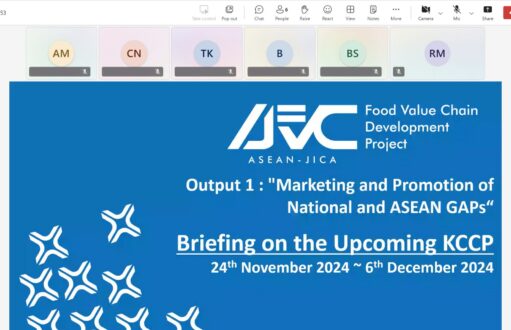In November 2024, a study tour was held in Japan as a part of the AJFVC Output 2 project, focusing on food safety and Sanitary and Phytosanitary (SPS) regulations. A total of twelve representatives from six ASEAN nations—Brunei Darussalam, Indonesia, Malaysia, the Philippines, Singapore, and Thailand—spent ten days in Tokyo and Sapporo, Japan, to gain insights into pesticide control and residue analysis, as well as food safety standards.
The program began on November 18th with a presentation from Japan’s Ministry of Agriculture, Forestry, and Fisheries (MAFF), covering Japan’s regulatory approaches to ensuring food safety, implementing SPS measures, and supporting the export of Japanese agricultural products. Participants then visited the Food and Agricultural Materials Inspection Center (FAMIC) to learn about its critical role in pesticide registration and pesticide residue detection in agricultural products. The participants also toured two farms within the Japan Agricultural Cooperatives (JA) Tokyo-Musashi’s service area.
Throughout the week, the participants explored the substantial contributions of JA, Japan’s largest agricultural cooperative, which provides affordable agricultural inputs to farmers. The group then moved to Sapporo, where they learned about Hokuren, an organization overseeing agricultural product sales in Hokkaido, and toured its pesticide residue laboratory. The tour concluded with visits to Shinshinotsu Village and Otsuka Farm, emphasizing practices in organic and sustainable farming. At the end of the study tour, participants presented their findings and outlined potential actions to implement in their respective countries.
Imelda from the Bureau of Plant Industry in the Philippines expressed her appreciation for the experience, stating, “The sessions that left a lasting impression on me were Pesticide Residue Inspection Initiatives in Hokkaido and Hokuren and Ensuring Food Safety and Security at JA. Both topics are closely aligned with my current work in the laboratory. I was thrilled to see that the practices we implement in our laboratory are nearly on par with those showcased in the featured laboratories. The speakers shared valuable insights that we can integrate into our work to further enhance our laboratory practices.”
This study tour provided participants with an invaluable opportunity to understand Japan’s pesticide regulations and observe the latest analytical instruments and methods for pesticide residue analysis in leading public and private agricultural institutions, allowing them to apply this knowledge to improve laboratory practices further.
